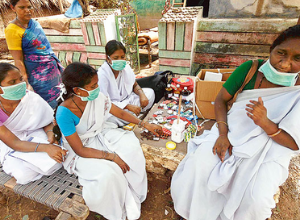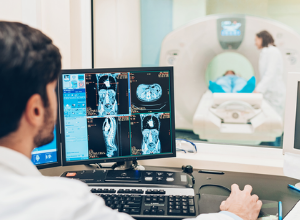Description
This program is aimed at training candidates for the job of a “Blood Bank Technician”, in the “Health Care Sector Skill Council” Sector/Industry and aims at building the following key competencies amongst the learner:
| 1. Assists in Blood Bank by collecting samples and sorting the samples in a manner which is identifiable.
|
2. Assists in a lab to collect, label and store blood. |
| 3. Maintaining Blood Donor’s Medical History and Screen Donors
|
4. Assists in testing samples to screen potential donors, store blood, draws and maintain documentation and records.
|
| 5. Make patients comfortable during the procedure and monitor their vital signs.
|
6. Assists in checking compatibility of blood before issuing it for transfusion. |
This course encompasses 15 out of 15 National Occupational Standards (NOS) of “HSS/Q2801/Blood Bank Technician” Qualification Pack issued by “Health Care Sector Skill Council”.
| S.
No |
Topic/Module | Duration
(in Hours) |
Key Learning Outcomes | Corresponding NOS Code |
| 1 | Blood Bank Techniques and Management | 120 Hrs | · Assist nurse in checking vital parameters
· Collect blood donors medical history and screen donors · Draw blood from donor · Monitor donor during the donation procedure · Screen donated blood for presence of any infection · Document, label and store blood donations · Check compatibility of blood |
HSS / N 2801
HSS / N 2802 HSS / N 2803 HSS / N 2804 HSS / N 2805 HSS / N 2806 HSS / N 2807
|
| 2 | Professional Culture, Protocols, Code of Conduct and Waste disposal standards | 60 Hrs | · Act within the limits of one’s competence and authority
· Work effectively with others · Manage work to meet requirements · Maintain a safe, healthy and secure environment · Practice Code of conduct while performing duties · Follow biomedical waste disposal protocols · Follow infection control policies and procedures · Monitor and assure quality
|
HSS/ N 9603
HSS/ N 9604 HSS/ N 9605 HSS/ N 9606 HSS/ N 9607 HSS/ N 9609 HSS/ N 9610 HSS/ N 9611
|
| 3 | Communicative English and Official Communication
(Written and Oral)
|
20 Hrs |
· Candidate should able to Communicate in English. · Candidate should able to read and write so that he/she should able to understand the prescription. |
Additional as Required for the Job Role |
| 4 | Computer Fundamentals | 20 Hrs | · Candidate should able to use computer for maintaining records for statistical database
· Candidate should able to use computer for maintaining records for Blood donors medical history.
|
Additional as Required for the Job Role |
| 5 | Immunohaematology | 16 Hrs | · Basic Principles of immunohaematology, Application of Blood groups: Population Genetics, Forensic medicine, Transfusion medicine
· ABO Blood of Group Systems: History, Genetics, ABH antigens, Biochemical Synthesis of blood group antigens, Antigenic sites, weaker variants, Bombay Phenotype, ABO antibodies · RH Blood Group System: History, Genetics, Molecular Genetics, Nature of Rh Antigens, Partial D, Week D, other variants of Rh, Rh Null, Rh antibodies, factors influencing Rh immunization, Functional role of Rh antigens · Other Blood Group Systems: Lewis, P, Ii, MNSs, Kell, Duffy, Celano, In, Private antigens, Public antigens. · Antenatal Serology, Hemolytic disease of the newborn due to ABO Incompatibility, Rh Incompatibility and other allo-antibodies · Red cell serology techniques, their advantages and disadvantages, Cell and serum grouping, detection of weak A and B antigens and weak D/Partial D cases, Trouble shooting in red cell serology · Pre transfusion testing, Different methods of cross matching, cross matching in special circumstances, emergency cross matching, electronic cross matching · Principles of Direct and indirect antiglobulin test, enzyme technique, albumins technique, Detection of blood group antibodies, identification of their Specificity, clinical significance of antibody detection, differentiation between auto and allo-antibodies · Gel Technology, Microplate technique
|
Additional as Required for the Job Role |
| 6 | Haematology | 12 Hrs | · Collection of blood samples, types of anticoagulants
· Complete hemogram, Different methods of hemoglobin screening/estimation: Copper sulphate, hematology analyzers, Sahli’s, Cyanmethhemoglobin and Hemo-Q methods, Red cell indices · Normal erythropoiesis, Leucopoiesis, Formation and function of platelets · Classification of anemia, their laboratory diagnosis, Hemoglobinopathy: Beta Thalassemia and Sickle cell disease, G6PD deficiency, polycythemia · Autoimmune hemolytic anemia, classification, diagnosis, specificity of autoantibodies · Coagulation Mechanism, Hemostasis, laboratory tests for coa, Hemophilia A & B, Platelet disorders, · Hematological malignancies · Bone marrow transplantation, peripheral stem cells, cord blood stem cells, cord blood banking
|
Additional as Required for the Job Role |
| 7 | General Immunology
|
12 Hrs | · Introduction to Immunology, History, Immunity
· Antigens : Immunogen, allo-antigen, soluble antigen, Red cell antigen, Epitopes · Antibodies: Polyclonal antibodies, development of antibodies, structure of immunoglobulin, characteristics of immunoglobulin · Monoclonal antibodies: Hybridoma technology, Human monoclonal antibodies, Applications of MAb · Antigen antibody reaction: Antigen concentration, antibody concentration, enhancing media, other factors influencing antigen antibody reaction, Immunoassays: ELISA, IRMA, RIA · Cells of immune system: Phagocytic cells, Antigen presenting cells, T cells, T cell subsets, B cells, CD Markers, Flowcytometry for counting T & B cells · Autoimmune disorders, their mechanisms, · Complement System · HLA antigens, HLA antibodies, HLA Serology, Histocompatibility matching: Molecular methods
|
Additional as Required for the Job Role |
| 8 |
Microbiology and Biochemistry |
10 Hrs | · Introduction to Microbiology, Fundamentals of microscopy, sterilization and disinfection
· Groups of Micro organisms, Micro organisms staining techniques · Bacteriological media, Pure cultures and cultural characteristics, Bacteria of medical importance, · Transfusion transmitted infections, HIV (1+2), HCV, HBV, malaria, syphilis · ELISA, rapid and other tests for diagnosis of transfusion transmitted infections · Biosafety, Management of Biomedical waste · Introduction to Biochemistry, Acid and Base, Buffers and Buffer action, pH, The Beer Law & its application · Carbohydrates, proteins, Lipids and Lipoproteins, Red cell membrane integral proteins and lipids, Biochemical estimation of Blood sugar, proteins, Lipid profile and kidney function tests · Instrumentation principles: pH meter, colorimeter, Spectrophotometer, Electrophoresis equipment
|
Additional as Required for the Job Role |
| 9 | Blood Banking: Blood Donation
|
10 Hrs | · Classification of Diseases
· Droplet infection, Measeles, Chicken Pox, Small Pox, Mumps and Influenza · Diseases affecting Respiratory System: Tuberculosis, Pneumonia, Asthma, Bronchitis · Diseases affecting Gastro Intestinal System: Dysentery, Diorrhea, Typhoid, Cholera, Peptic Ulcer, Liver Diseases (Jaundice, Hepatitis, Cirrhosis, Gastritis, Appendiciitis) · Skin Diseases & Venereal Diseases, Scabies, Soriasis, Fungal Infection, Venereal Diseases, Leprosy · Blood Anaemia, Leukemia, Bleeding Disorders · Urinary Diseases: Glomerulo Nephritis, Pyelo Nephritis · Cardiovascular Diseases: Angina Pectoris, Hypertension, Valvular Diseases · Nervous System- Polio, Meningitis · Viral Diseases : Aids, Rabies · Insect-Born Diseases: Malaria, Filariasis
|
Additional as Required for the Job Role |
| 10 |
Transfusion Therapy |
10 Hrs | · Aims & Principles of Health education
· Methods of Health Education · Effects of health education · Levels & practice of health education · Need of Health education to attain positive health
|
Additional as Required for the Job Role |
| 11 | Quality Control Documentation and Legal Aspects of Blood Banking | 10 Hrs | · Quality control of blood grouping regents, QC of anti-human globulin reagent, bovine albumin, Normal saline
· Quality control of blood bank raw materials and kits. · Quality control of different blood bank Components, sterility test on component. · Automation in blood bank · Calibration, validation and maintenance of blood bank equipment, QC of blood bank techniques, internal and external QC. · Organization of blood bank services, Blood Bank premises and infrastructure, Regional blood transfusion centre and blood storage centres, Blood bank management system · Regulations for blood bank operation: Drugs and cosmetics Law, National blood policy, standards in Blood Banking, licensing procedures. · Recruitment and training of blood bank personnel, Proficiency test. · Blood Bank Accreditation
|
Additional as Required for the Job Role |
On Job Training: 150 Hours
Total Programme Duration: 450 Hours (300 Hrs Theory & 150 Hrs OJT)
(This syllabus/ curriculum have been approved by Health Care Sector Skill Council (name of relevant Sector Skill Council or NSDC designated authority).







Reviews
There are no reviews yet.